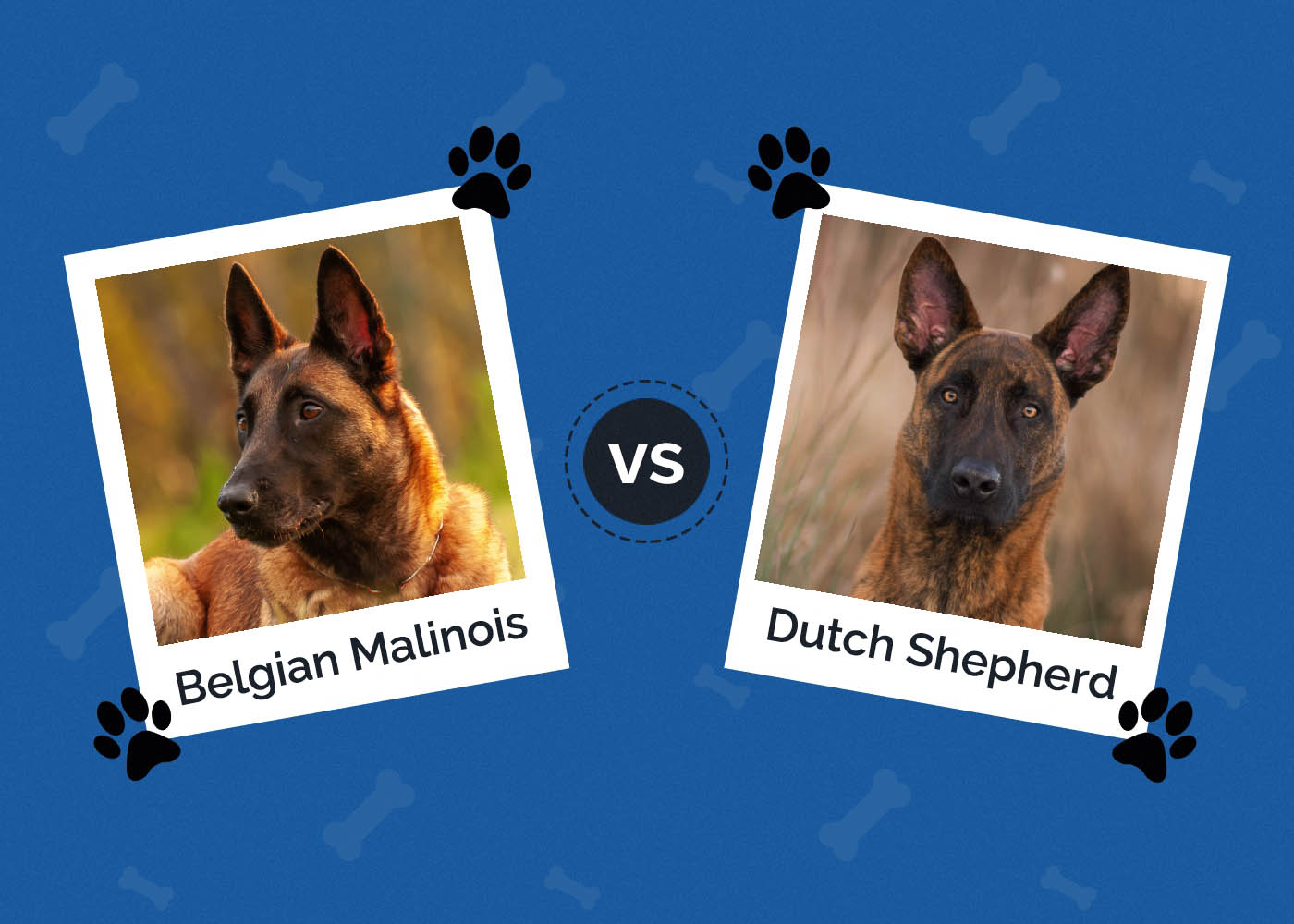Dog Losing Hair Around Their Eyes? 9 Reasons Why, and What to Do

Updated on
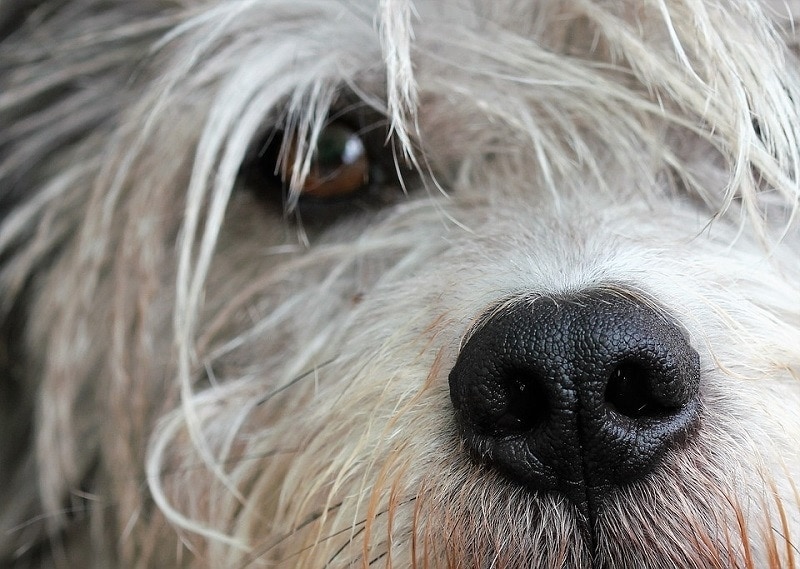
If you’ve noticed that your poor pup seems to be losing hair from around his eyes, you’re probably wondering if it’s something you should worry about. There are a number of conditions behind this problem, and while some are not serious, in many cases, there could be an underlying problem that should be checked by your vet.
Read on below to find out more.
Why Is My Dog Losing Hair Around His Eyes?
Most of the problems might be based on minor conditions such as allergies or fleas, but they might also stem from an infection or an issue with the eye itself. If you’re unable to pinpoint the problem or it appears to be originating from a serious health condition, take your dog to your vet as soon as possible.
These are the 9 reasons why your dog might be losing hair from around his eyes and how you should handle it:
1. Allergies
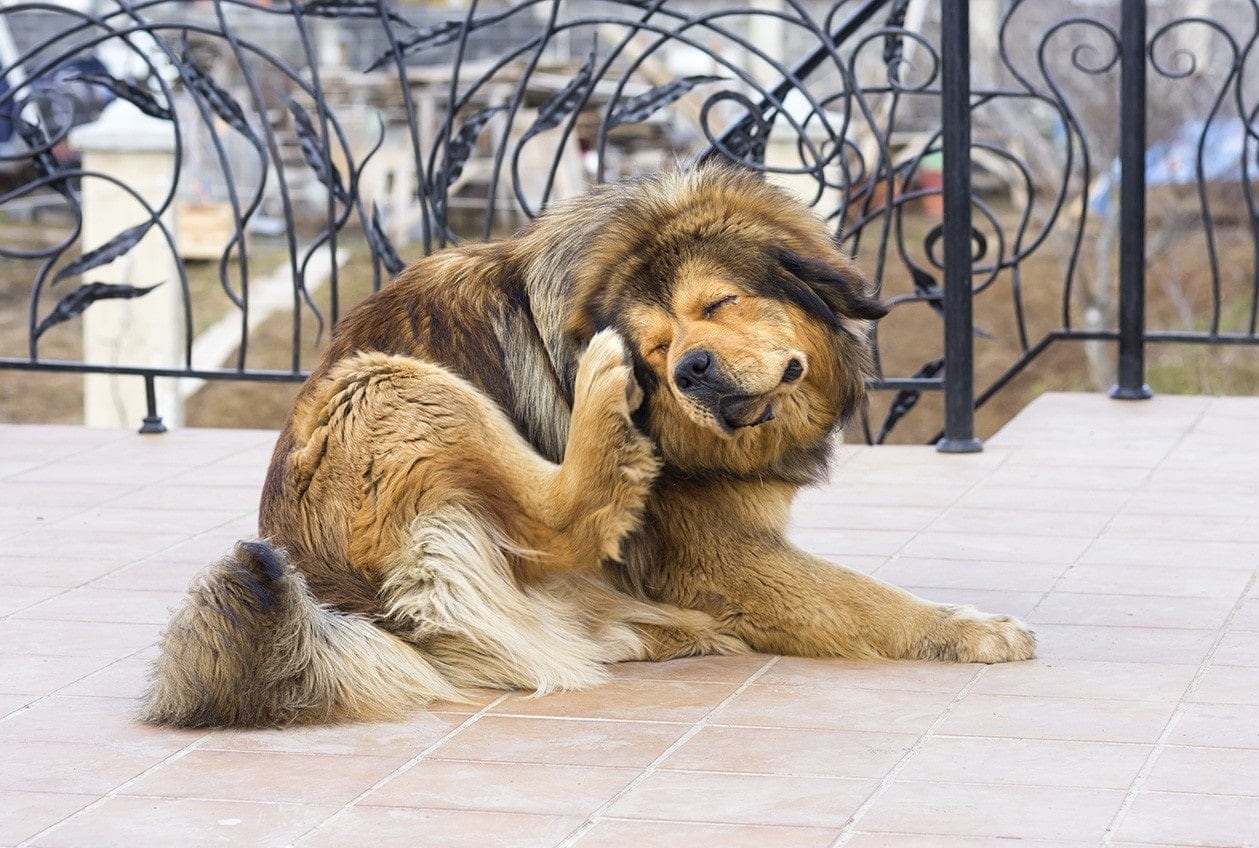
There are a number of allergies that can affect dogs and cause itchy and irritated skin. Particularly around the mucous membranes on his face such as the mouth, ears, nose, and particularly the eyes. If your dog’s eyes are watery and red and accompanied by sneezing and a runny nose, he might be allergic to something in his environment (such as pollen, dust, or his food). If your dog is rubbing at his eyes with the carpet or his paws, this can cause hair loss around his eyes.
| What to Do | Start by speaking to your vet so they can help you to determine what is causing your dog’s allergic reaction. When you discover what the problem is, you can avoid it and/or treat it. If it’s a food allergy, the process of elimination is how you can figure out what exactly is causing the problem (you can read more about that here).
If it’s environmental, you can do your best to remove the offender from your home and wash everything thoroughly. If it’s from outside, such as pollen, you can consider using hypoallergenic wipes, such as these, or give your dog a bath using a good shampoo and just wipe him or brush him after a walk. |
2. Atopic Dermatitis

- Itching and scratching
- Excessive licking and rubbing
- Tough or red skin
- Skin may be greasy
- Yeasty smell
It most commonly affects the eyes, ears, belly, feet, base of the tail, groin, armpits, and muzzle.
| What to Do | Your vet should be your first and best option for treatment. |
- Immunomodulatory medications: This kind of medication will eliminate the itchiness caused by atopic dermatitis.
- Hyposensitization: When your vet can determine the cause of your dog’s allergies, small doses of the allergens are injected, and he will build up a tolerance to the allergens.
- Antibacterial and antifungal medications: Another issue with atopic dermatitis is bacterial and yeast infections that might also crop up. Your vet may prescribe antibacterial or antifungal medications that you would apply topically.
- Shampoo: There are many kinds of medicated shampoos available that are designed to relieve your dog’s itchy skin.
3. Conjunctivitis
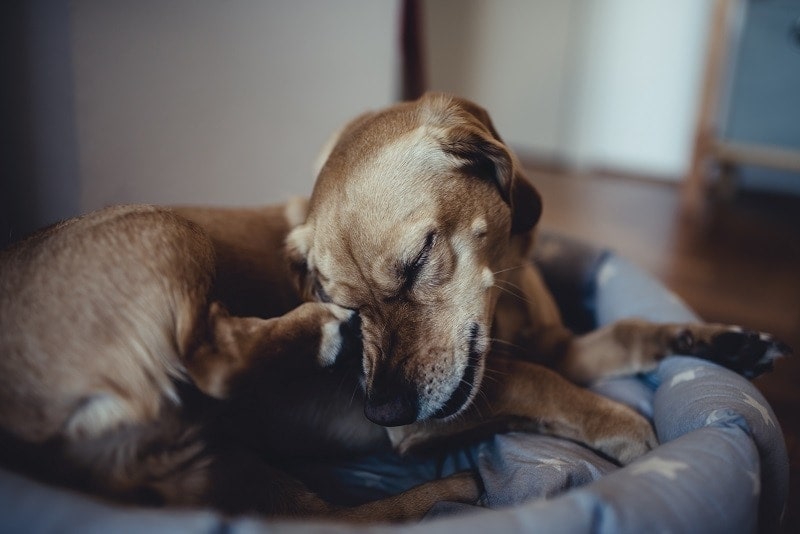
If your dog contracts conjunctivitis, or pink eye, it is quite possible he will rub some of the hair away from around his eyes with his paws. You can read more about how your dog may have gotten pink eye here.
- Excessive blinking and squinting
- Swelling around the eyes and on the eyelid
- Redness on and around the eye
- Pus discharge from the eye
| What to Do | The treatment will depend on the underlying cause of the conjunctivitis. If it is a bacterial infection, treatment will usually be an antibiotic ointment, and will otherwise prescribe medication to treat the inflammation. |
4. Demodicosis
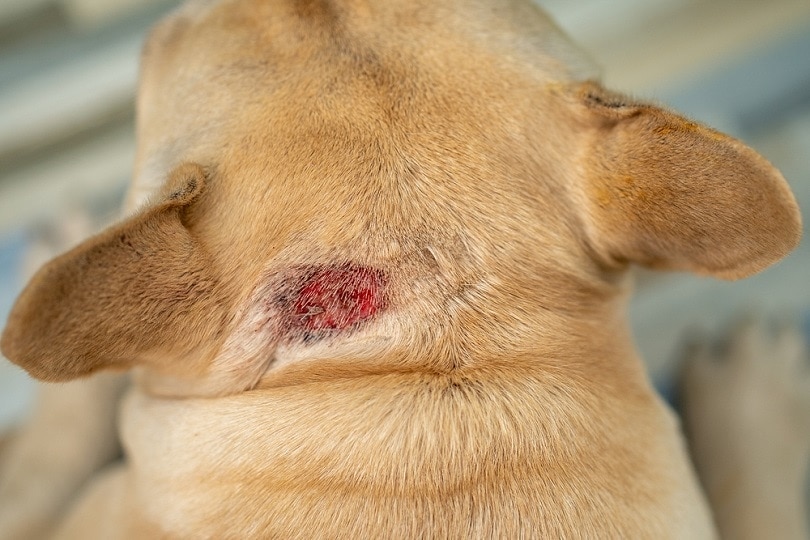
All dogs have a colony of tiny mites that permanently live on their skin, but if the number of mites increases, it can cause hair loss, sores, and skin infections.
| What to Do | Demodectic mange usually clears up on its own, which generally happens in about 90% of the cases. However, if your dog has a serious case, there are medications that can be prescribed by your vet in addition to using flea and tick medication (which will also require a prescription). |
5. Fleas
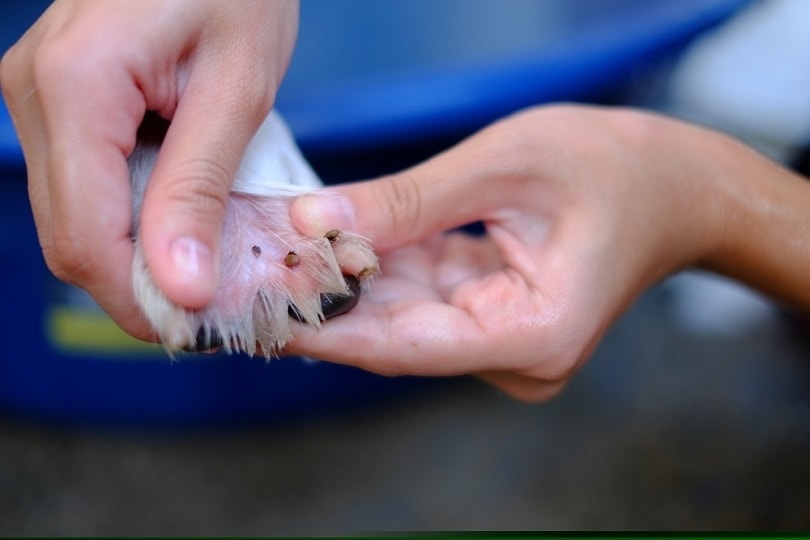
Fleas are tiny brown parasites that can create irritation or even allergic reactions through their bites and saliva. They are usually more commonly located at the base of your dog’s ears and tail but can be found almost anywhere on your dog. You can generally tell if your dog is suffering from fleas with their excessive scratching, and if you look through their fur, you’ll see them moving. You can also look for tiny black pepper-like bits, which are flea droppings.
| What to Do | You can usually fix the flea problem at home using pills, chewables, and spot treatments, as well as flea shampoos. If the flea infestation is severe, your vet can prescribe something stronger. You will also need to clean everything your dog has been lying on as fleas and flea eggs could still be present. |
6. Glaucoma

Glaucoma is a very serious condition that, if left untreated, can cause blindness. It’s a condition that places pressure on an eye and will cause improper drainage of the fluids in the eye. In some cases, the dog may rub at his eye since the condition can be painful, which could lead to hair loss in that area.
- Eye blinking
- Redness in the whites of the eyes
- Receding eyeball
- Pupils may be dilated or not be responsive to light
- Cloudy eye
| What to Do | Visit the vet immediately if you suspect your dog may have glaucoma. Your vet will give your dog a number of medications that will lower the pressure in the eye. The use of cyclo cryotherapy (which uses a cold temperature to destroy the cells that produce the fluids in the eye) may stop or slow down the condition. Surgery might be in order if the glaucoma is too far gone and, in some cases, the eye may need to be removed. |
7. Infections

There are a number of infections that can be caused by parasites (fleas, ticks, and mites), as well as by fungal and bacterial problems. Any of these can cause skin irritation, which can be exacerbated by your dog rubbing at his eyes. There are also infections of the hair follicles such as vesiculopustular dermatoses.
| What to Do | Your vet will need to check the infection to ensure that it isn’t serious or that it’s a sign of an underlying health problem. Most minor skin infections will probably clear up on their own, but your vet may need to prescribe a special shampoo and antibiotics. |
8. Injury to the Eye

There is always the possibility that a foreign body might be caught in your dog’s eye, and his rubbing and pawing in this area is in response to discomfort or pain. This can create bald spots around the eye but could also further damage it. If you suspect there’s an injury to the eye, take your dog to the vet immediately.
| What to Do | You could use an eye rinse to help dislodge the object but never use your fingers or tweezers. Take your dog to the vet if the rinse does not help. If it’s an injury, your vet may give your dog an Elizabethan collar to stop your dog from scratching as well as an antibiotic. |
9. Ringworm
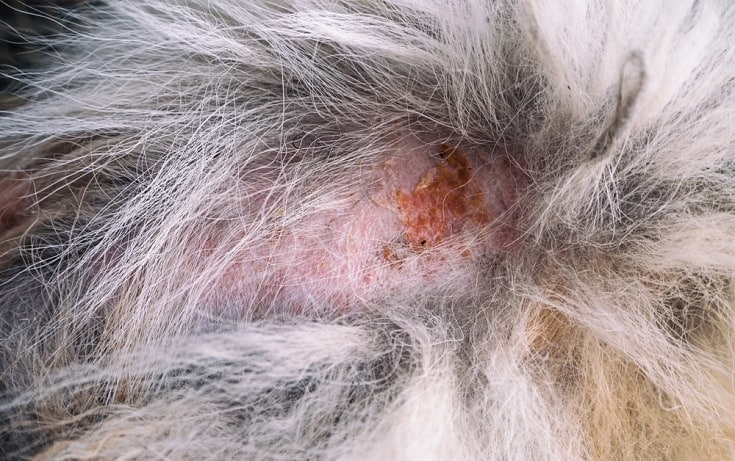
Ringworm does not involve a worm, thank goodness, but it is a fungal infection that is highly contagious to animals and humans.
- Crusty skin
- Scaly dandruff
- Darkened skin
- Ulcers
- Itchiness
- Hair loss in a circular pattern or patchy
| What to Do | If your dog does have ringworm, he must be quarantined immediately because it can be easily spread. In milder cases, a skin treatment should work, such as a skin flush. In more serious cases, your vet will usually prescribe an oral antifungal medication. |
 Conclusion: Dog Losing Hair Around Eyes
Conclusion: Dog Losing Hair Around Eyes
If your dog has been losing hair around his eyes, it could indicate that he might have a serious health condition, and taking him to your vet is the best course of action. Once you’ve treated the underlying health issue, the hair should grow back, and your pup will be as adorable and, most importantly, as healthy as ever.
See also:
Featured Image Credit: martaposemuckel, Pixabay

 Conclusion: Dog Losing Hair Around Eyes
Conclusion: Dog Losing Hair Around Eyes
